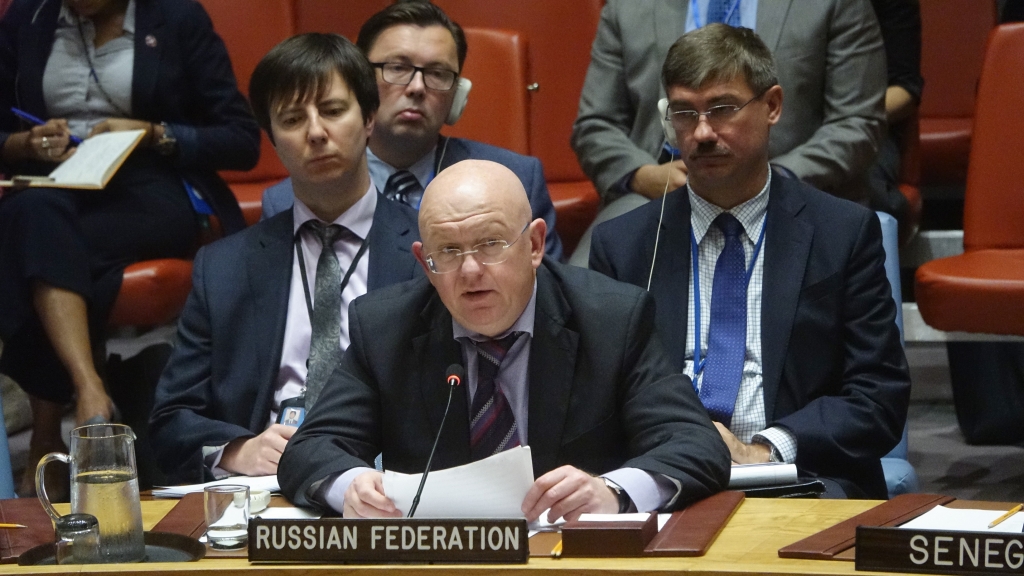Statement by Ambassador Vassily A. Nebenzia, Permanent Representative of the Russian Federation to the United Nations, during the UN Security Council meeting on the situation in Myanmar
We are grateful to the Secretary-General for his briefing on the situation in Rakhine state in Myanmar. We share his concern about the serious worsening of the situation in the region, which was provoked first and foremost by fighters of the Arakan Rohingya Salvation Army. We resolutely condemn their armed attempts to undermine efforts to stabilize the situation in Rakhine state.
We are concerned about the mass exodus of Muslim, Buddhist and Hindu refugees, as well as the ensuing humanitarian crisis. We empathize with those who find themselves in such a difficult situation and those whose rights have been violated.
At the same time, the information that we are receiving indicates that the situation in Rakhine state is far from unequivocal. In recent days, evidence has been received of the involvement of fighters of the Arakan Rohingya Salvation Army in the massacre of civilians. Moreover, caches of improvised explosive devices have been discovered.
There is evidence that the extremists have forced members of Myanmar’s Hindu community in border villages to leave their homes and migrate to the territory of neighbouring Bangladesh in the same stream as Muslims. Furthermore, there is evidence of arson attacks on entire villages carried out by terrorists. Photographs confiscated from detained militants were apparently intended to contribute to reports to the leadership of the Arakan Rohingya Salvation Army or its foreign sponsors. Those data back up statements made earlier by the authorities of Naypyitaw that the initiators of the outbreak of violence in Rakhine state sought to maximize the scale of the humanitarian catastrophe and shift all blame for it to the Government.
We appreciate the efforts of the Myanmar authorities to resolve the situation in Rakhine state and support the dialogue with relevant United Nations agencies and human rights bodies, including the work initiated by the Naypyitaw, in cooperation with the International Committee of the Red Cross and the International Federation of Red Cross and Red Crescent Societies, in order to organize humanitarian assistance to the affected population.
We note the readiness of the Myanmar authorities to repatriate refugees from the territory of Bangladesh on the basis of the procedures provided for by the bilateral agreement with that country of 1993, and to send the current lists of leaders and fighters of the Arakan Rohingya Salvation Army to the Bangladesh side, INTERPOL and United Nations specialized bodies. The authorities of Myanmar have invited the Bangladesh side to begin negotiations between ministers responsible for security issues and intensify contacts through the ministries of foreign affairs. We think that would prove useful.
We pay tribute to the efforts of the Government of Bangladesh, which has shown solidarity and sheltered hundreds of thousands of refugees from Myanmar. We hope for the solid support of the international community in resolving the humanitarian crisis. These people should receive assistance. The leadership of Myanmar has begun to implement the recommendations of the Advisory Commission on Rakhine State, chaired by Mr. Kofi Annan, and established an Implementation Committee that has already held two meetings.
I wish to stress that excessive pressure on Naypyitaw in the current situation can only aggravate the situation in and around the country. We maintain our unchanging position that there is no alternative to resolving the existing problems in Rakhine state except through political means and a dialogue between representatives of all nationalities and faiths.
We call on the parties involved and external stakeholders to demonstrate restraint and objectivity in their assessment of ongoing events. We need to be very precise in using terms like “genocide” and “ethnic cleansing”.
It is important to focus on practical assistance to the Governments of Myanmar and Bangladesh in their search for a solution to the complex and difficult problem at hand, in the spirit of equality and mutual respect. It is necessary to stop the violence and the incitement that fuels it.
We must prevent further radicalization in the region, which can be used by terrorists and extremists who are already trying to establish roots in South-East Asia. We are also concerned by how the situation might impact regional stability.
We welcome the fact that Naypyitaw is not rejecting interaction with the United Nations. The National Security Adviser to the President of Myanmar, who was in New York during the past week, invited the Secretary-General and his Under-Secretary-General, Mr. Feltman, to visit the country in order to facilitate the process of national reconciliation.
It would be unreasonable to squander the opportunity to tap into the mediation efforts of the United Nations. In any case, it is necessary to seek the constructive involvement of the Government and representatives of all nationalities and faiths in resolving this long-standing complex crisis. We should not forget about the urgent task of increasing the socioeconomic development of Rakhine state.
